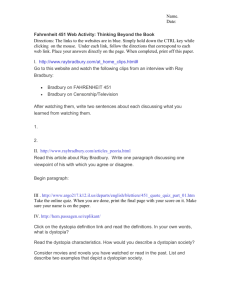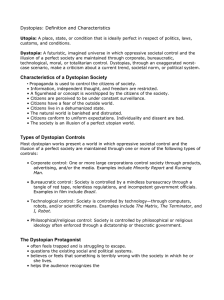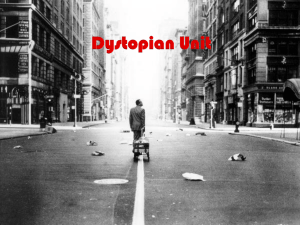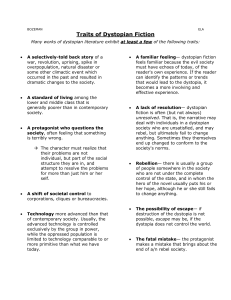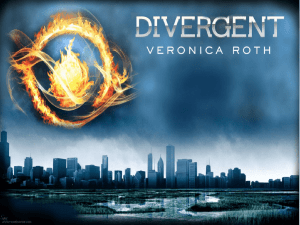File dystopias
advertisement
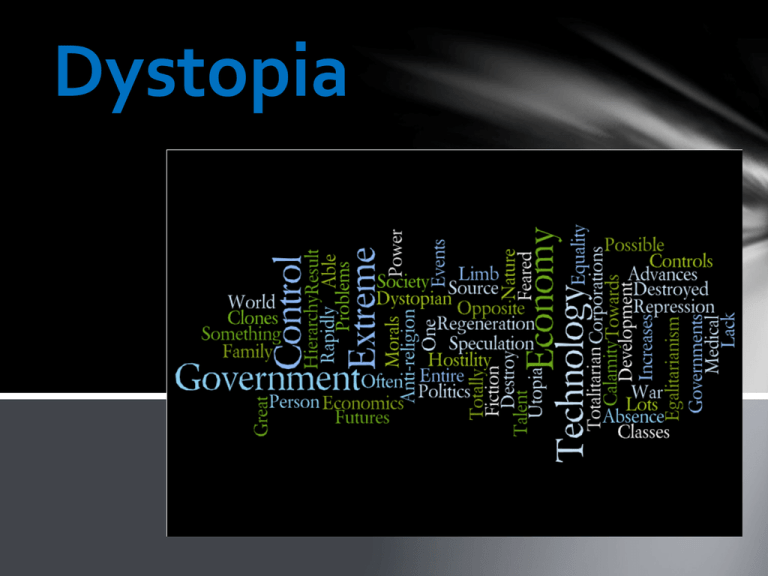
Dystopia Utopia: A place, state, or condition that is ideally perfect in respect of politics, laws, customs, and conditions. Dystopia: A futuristic, imagined universe in which oppressive societal control and the illusion of a perfect society are maintained through corporate, bureaucratic, technological, moral, or totalitarian control. Dystopia: Author’s Purpose: Dystopias, through an exaggerated worst-case scenario, make a criticism about a current trend, societal norm, or political system. "Many societies in fiction are depicted as utopias when in fact they are dystopias; like angels and demons, the two are sides of the same coin. This seemingly paradoxical situation can arise because, in a dystopia, the society often gives up A in exchange for B, but the benefit of B blinds the society to the loss of A; it is often not until many years later that the loss of A is truly felt, and the citizens come to realize that the world they once thought acceptable (or even ideal) is not the world they thought it was. That’s part of what is so compelling—and insidious— about dystopian fiction: the idea that you could be living in a dystopia and not even know it." John Joseph Adams Characteristics of a Dystopian Society 1. Propaganda is used to control the citizens of society. 2. Information, independent thought, and freedom are restricted. Characteristics of a Dystopian Society 3. A figurehead or concept is worshipped by the citizens of the society. 4. Citizens are perceived to be under constant surveillance. Characteristics of a Dystopian Society 5. Citizens have a fear of the outside world. 6. Citizens live in a dehumanized state. Characteristics of a Dystopian Society 7. The natural world is banished and distrusted. 8. Citizens conform to uniform expectations. Individuality and dissent are bad. Characteristics of a Dystopian Society 9. The society is an illusion of a perfect utopian world. Types of Dystopian Controls Most dystopian works present a world in which oppressive societal control and the illusion of a perfect society are maintained through one or more of the following types of controls: 1. Corporate control: One or more large corporations control society through products, advertising, and/or the media. Examples include Minority Report and Running Man. 2. Bureaucratic control: Society is controlled by a mindless bureaucracy through a tangle of red tape, relentless regulations, and incompetent government officials. Examples in film include Brazil, Starship Troopers, and V for Vendetta. 3. Technological control: Society is controlled by technology—through computers, robots, and/or scientific means. Examples include The Matrix, The Terminator, and I, Robot. 4. Philosophical/religious control: Society is controlled by philosophical or religious ideology often enforced through a dictatorship or theocratic government. Hunger Games, Children of Men, and Priest. Ray Bradbury: 1920-2012 Fahrenheit 451 Fahrenheit 451 by Ray Bradbury (1953) • The story takes place in the twenty-first century, in an America where books are banned. • Society feels that “opinion” books contain conflicting theories, which are disruptive to society. • The penalty for owning one of these books is having one's house and books burnt by "firemen." • 451° F is stated as “the temperature at which book paper catches fire and burns…” “You don't have to burn books to destroy a culture. Just get people to stop reading them.” Ray Bradbury Relation to the Real World “I don't try to describe the future. I try to prevent it.” Ray Bradbury In the novel, Bradbury combined several issues of his contemporary society: • The burnings of books in Nazi Germany. • Stalin's suppression of authors and books in the Soviet Union. • The explosion of a nuclear weapon. Relation to the Real World The author also addresses the concern that the presence of fast cars, loud music, and advertisements creates a lifestyle with too much stimulation where no one has the time to concentrate. He also addresses concerns about censorship at the expense of personal expression. The Dystopian Protagonist • he/she often feels trapped and is struggling to escape. • he/she questions the existing social and political systems. • he/she believes or feels that something is terribly wrong with the society in which he or she lives. Effect …the protagonist helps the audience recognize the negative aspects of the dystopian world through his or her perspective/experiences. “There are worse crimes than burning books. One of them is not reading them.” Ray Bradbury Other Dystopian Novels: Animal Farm Lord of the Flies 1984 We Handmaid’s Tale Brave New World
